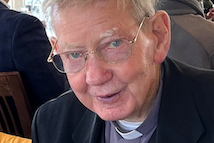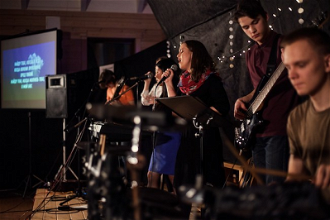Text: Cardinal Murphy-O'Connor at memorial Mass for victims of Hurricane Katrina
Yesterday morning, Cardinal Cormac Murphy-O'Connor was chief celebrant at a memorial Mass for the victims of Hurricane Katrina at Westminster Cathedral. The full text of his homily follows below: Dear friends, How extraordinary to hear, as we gather under God to remember today the victims of Hurricane Katrina, those words of Jesus' in the Gospel of Matthew. "The rain fell, the floods came, and the winds blew and buffeted the house " That is exactly what happened three weeks ago on the Gulf Coast of the United States. We have, perhaps, a reason to be thankful that the death toll appears to be closer to 500 than the thousands originally forecast. But pain is not measured in numbers. The loss of those 500 residents of Mississippi and Louisiana is still all but unbearable to those who knew and loved them. We offer our Mass today for the repose of the souls of the faithful departed of all those who died three weeks ago. We ask God the loving Father, who is near to all who call him, as the Psalmist says, to comfort their relatives and friends. But we gather, also, in solidarity with the tens of thousands of people whose lives were ripped apart by Katrina's deadly combination of violent winds and 30-foot tidal surges. At least a third of the dwellings in America's two poorest states were destroyed, and most of those that stayed standing have suffered terrible damage. The human cost, in homelessness and joblessness, is, at this stage, incalculable; and the economic consequences will be felt for years to come. Lives have been shattered and will not soon be put together again. Our first reading today invites us to contemplate the sheer otherness of God. Isaiah asks us to free God from the confines which our own expectations and fears are prone to place on Him. We need to pray to receive God and God's terms. That means sometimes accepting, with faith, that those we love will leave us before time; it means accepting that life is so often a casting-off. How hard this is, sometimes, to understand. But as St Augustine said: "If you understand him, he is not God." His ways are far above our ways. One of the effects of disasters on the scale of the Tsunami, with which our year began, or of Katrina three weeks ago, is to flip the cover off our societies, exposing the vulnerability of human beings and our dire need of each other and of God. As the secretary-general of the United Nations said a few days ago, "We have seen that even the strongest among us cannot succeed alone". Perhaps the saddest thing I read in the aftermath of Katrina were the words of a member of a emergency relief committee in New Orleans. "Whenever we came to the question of how the poorest 100,000 would get out of the city in the event of disaster," he said, "there would be silence around the table." How can we read the fierce words of Scripture regarding the poor and the weak and not be horrified at the abandonment of those who who were least ble to bear the brunt of the storm? The sad truth which Katrina exposed is that there were far too many people living in poverty and in inadequate housing; and because they were forgotten in ordinary life, they were forgotten when disaster struck. The network of human solidarity had too many holes, and the poor dropped through them. Is this not what Jesus warns against when he compares people who do not listen to his words to those who build their houses on sand? Life is fragile. But we need not be afraid if our foundations are secure. If we renew our search for God, if we root ourselves in faith and in prayer, if we live in service for others and keep the poorest always in mind, then our foundations will be as unshakeable. Our societies will be strong. We will be strong. The response to Hurricane Katrina has shown this in countless ways. There may have been institutional failures, but the disaster has left us many images of great heroism: neighbour looked out for neighbour; strangers risked their lives for each other. The aftermath of the storm has shown countless examples of the generosity of individuals, cities and states that have opened their hearts to the refugees of the Gulf Coast. There are so many stories, but the one I like best is of a university chaplain at a student centre in Auburn, who spoke of the need which hurricane victims had for shoes. At the end of the Mass, about 200 students came up to leave their shoes at the altar, and went home barefoot. Katrina has lifted the lid on humanity, and exposed the difference between a society built on sand and a society built on rock. Let us, then, mourn the loss of so many lives in the southern United States. Let us lament for the poor who were ignored by the authorities, but let us rejoice at those who came selflessly to their aid. Let us pray that the lessons be learned from Katrina, not just about material preparedness for disaster, but above all the truth that we need each other, and we need God. Let us pray that when our societies are again put to the test, that we tend first to the vulnerable and the poor. And let us pray that, as the task of reconstruction begins, the societies of Mississippi and Louisiana might be rebuilt on new, rock-like foundations of human solidarity. Let us pray to accept God's terms: that everything we have and we are is of God, and that our security rests in that marvellous knowledge. Source: Archbishop's House


















